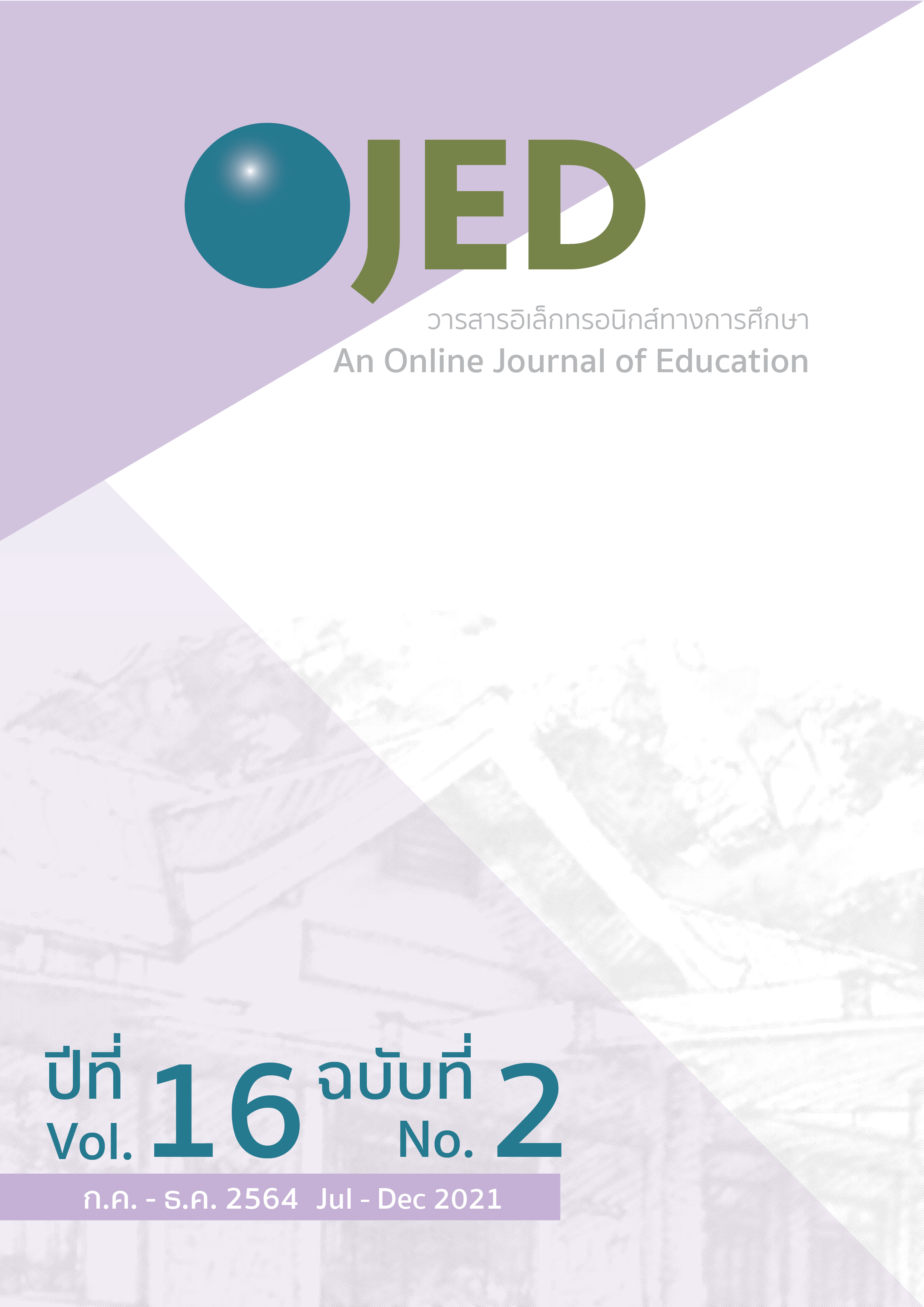Effects of Organizing Self-Directed Learning Activities Using Mobile Learning Technology on Information Literacy of Non-Formal and Informal Education Students
DOI:
https://doi.org/10.14456/ojed.2021.51Keywords:
self-directed learning, mobile learning, information literacy, informal education studentsAbstract
The purposes of this study were: 1) to study the effects of using self-directed learning activity by using mobile learning technology towards on information literacy of informal education students. 2) to study problem obstacle and suggestion of self-directed learning activity by using mobile learning technology towards information literacy of informal education students. This research used pre-experimental design. The sample were informal education student volunteers in Bangkok aged between 18 to 35 years old. The research instruments were questionnaire, activity plans, self-directed learning test, behavior test of information literacy learning, focus group and satisfaction questionnaire. The major findings were as follows: 1) The outcome of experiment indicates that average post-test score of self-directed learning behaviors and information literacy behaviors of the experimental group which had means scores after experiment higher at .05 level of significance and satisfaction of using self-directed learning activity by using mobile learning technology towards information literacy were high (M = 4.40, SD =0.21). 2) The problematic factors were 1. Content problem means the content of the lesson is not interesting and difficult to conclude. 2. The self-directed learning activity problem means the self-directed learning activity takes too much time for understanding than learning with teacher which students have no time for cause of their occupation. 3. Time period problem means we have enough time for doing an activity. 4. Learning media source problem means student do not know how to use the sources to gain the knowledge. 5. Environment problem means almost student does not have same in class timing schedule. 6. Assessment problem means there is no revise exercise.
References
ชุติมา สัจจานันท์. (2556). การรู้สารสนเทศ : แนวคิดการศึกษาและวิจัยในประเทศไทยและกลุ่มประชาคมอาเซียน. http://www.nstda.or.th/nac2013/download /presentation20130401-chutima-IL(CC-307-01-AM)pdf.pdf
ณรงค์ ป้อมบุปผา. (2550). เทคโนโลยีสารสนเทศและการสื่อสารเพื่อการเรียนรู้ตลอดชีวิต. อภิชาติการพิมพ์.
เทอดศักดิ์ ไม้เท้าทอง. (2554). การบูรณาการการรู้สารสนเทศในกระบวนการเรียน การสอนรายวิชาศึกษาทั่วไป หลักสูตรระดับปริญญาตรี [วิทยานิพนธ์ปริญญาปรัชญาดุษฎีบัณฑิต ไม่ได้ตีพิมพ์]. มหาวิทยาลัยขอนแก่น.
นงลักษณ์ แสงโสดา. (2553). ผลการรู้สารสนเทศด้านทักษะการสืบค้นสารสนเทศจากบทเรียนคอมพิวเตอร์ช่วยสอนแบบมีการฝึกปฏิบัติการสืบค้นกับแบบไม่มีการฝึกปฏิบัติการสืบค้นของนักเรียนชั้นมัธยมศึกษาปีที่ 1 โรงเรียนมัธยมพระราชทานนายาว [วิทยานิพนธ์ปริญญามหาบัณฑิต ไม่ได้ตีพิมพ์]. มหาวิทยาลัยบูรพา.
บุปผชาติ ทัฬหิกรณ์. (2551). การประยุกต์ใช้เทคโนโลยีสารสนเทศในการเรียนการสอน. โครงการเทคโนโลยีสารสนเทศตามพระราชดำริ สมเด็จพระเทพรัตนราชสุดาฯ สยามบรมราชกุมารี ศูนย์เทคโนโลยีอิเล็กทรอนิกส์และคอมพิวเตอร์แห่งชาติ.
ปรัชญนันท์ นิลสุข. (2551). เอ็มเลินนิ่ง (m-learning): การเรียนการสอนผ่านโทรศัพท์เคลื่อนที่. วารสารพัฒนาเทคนิคศึกษา, 20(66).
ปิยะ ศักดิ์เจริญ. (2553). การพัฒนารูปแบบการฝึกอบรมการศึกษานอกระบบโรงเรียนผ่านเว็บตามแนวคิดการเรียนรู้แบบนำตนเองและแบบใช้ทรัพยากรเป็นฐานเพื่อส่งเสริมการรู้สารสนเทศและการเรียนรู้แบบนำตนเองของผู้ใช้บริการศูนย์บรรณสารสนเทศทางการศึกษา [วิทยานิพนธ์ปริญญาครุศาสตรดุษฎีบัณฑิต ไม่ได้ตีพิมพ์]. จุฬาลงกรณ์มหาวิทยาลัย.
ไพฑูรย์ สินลารัตน์. (2554). สัตตสิกขาทัศน์ เจ็ดมุมมองการศึกษาใหม่และการเรียนการสอนนอกกรอบ 7 ประการ. จุฬาลงกรณ์มหาวิทยาลัย.
วิวัฒน์ มีสุวรรณ์. (2551). การพัฒนารูปแบบการเรียนการสอนผ่านเครือข่ายไร้สายบนเครื่องช่วยงานส่วนบุคคลแบบดิจิทัล (PDA) [วิทยานิพนธ์ปริญญาดุษฎีบัณฑิต ไม่ได้ตีพิมพ์]. มหาวิทยาลัยศรีนครินทรวิโรฒ.
อาชัญญา รัตนอุบล. (2542). การจัดการศึกษานอกระบบโรงเรียน. คณะครุศาสตร์ จุฬาลงกรณ์มหาวิทยาลัย.
อาชัญญา รัตนอุบล. (2549). รายงานการวิจัยการพัฒนารูปแบบการรู้สารสนเทศสำหรับสังคมไทย ระยะที่ 1. คณะครุศาสตร์ จุฬาลงกรณ์มหาวิทยาลัย.
อาชัญญา รัตนอุบล. (2550). รายงานการวิจัยการพัฒนารูปแบบการรู้สารสนเทศสำหรับสังคมไทย. สำนักงานคณะกรรมการวิจัยแห่งชาติ.
อรรจน์ บัณฑิตย์. (2550). การนำเสนอรูปแบบการเรียนการสอนบนเว็บด้วยกระบวนการเรียนรู้โดยใช้ทรัพยากรเป็นฐานเพื่อพัฒนาการคิดเชิงวิเคราะห์และการใช้สารสนเทศในการแก้ปัญหา
ของนักศึกษาระดับปริญญาบัณฑิต มหาวิทยาลัยวลัยลักษณ์ [วิทยานิพนธ์ปริญญาดุษฎีบัณฑิต ไม่ได้ตีพิมพ์]. จุฬาลงกรณ์มหาวิทยาลัย.
Chris Evans. (2008). The effectiveness of m-learning in the form of podcast revisionlectures in higher education. Computers & Education, 50(2).
Guglielmino, L. M. (1977). Development of the Self - directed learning readniness scale. Doctoral Dissertation, University of Georgia.
Horton, F. W, Jr. (2008). Understanding Information Literacy: A Primer. UNESCO.
KnowIes, Malcolm. (1975). Self-directed Learning: guide for learners and teacher. Forrett Publishing Company.
Downloads
Published
How to Cite
Issue
Section
License

This work is licensed under a Creative Commons Attribution-NonCommercial-NoDerivatives 4.0 International License.




